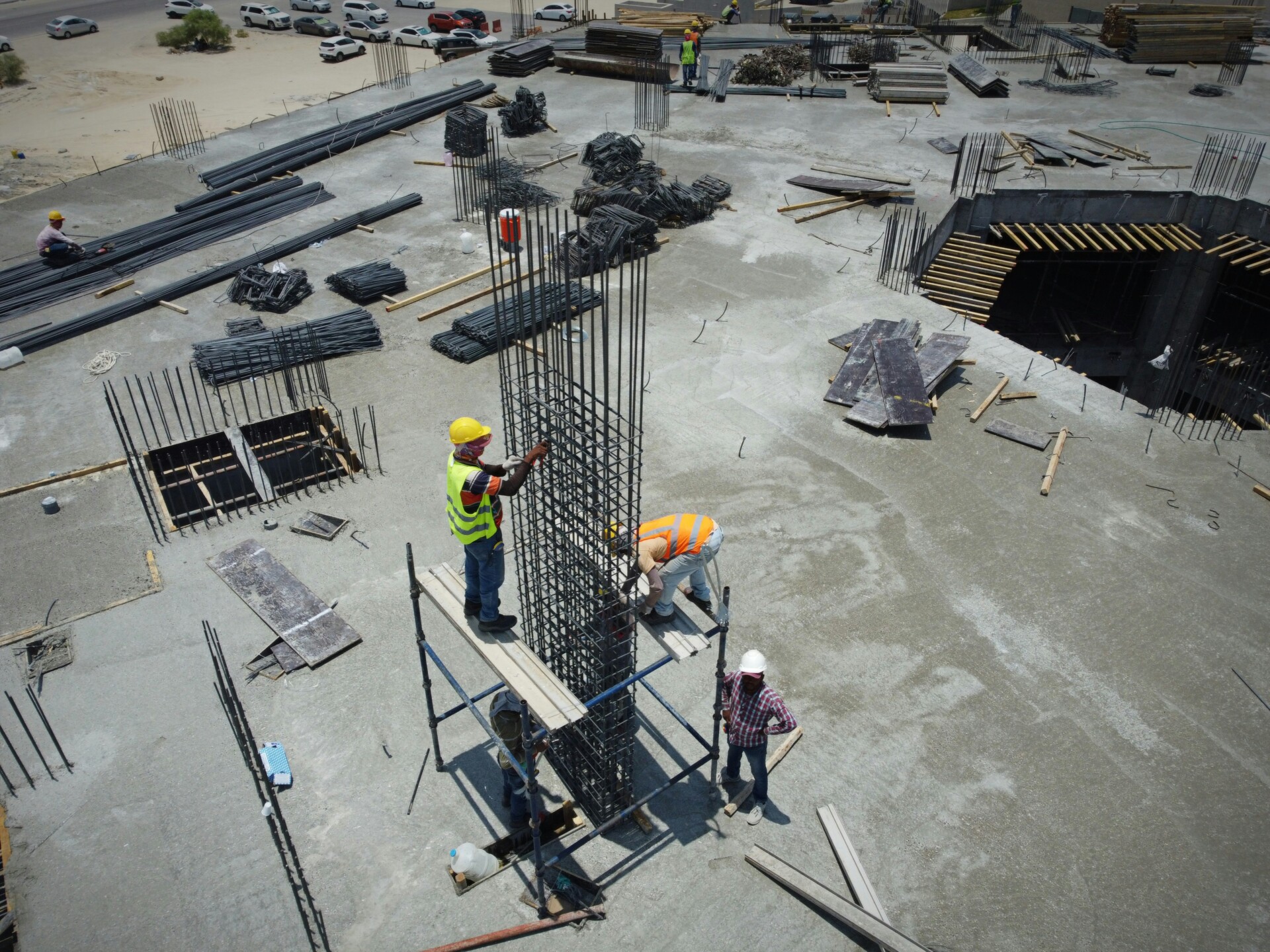Managing multiple commercial projects across Dallas requires more than a clipboard and spreadsheet. Commercial construction project scheduling software in Dallas creates a digital command center that connects field crews, office staff, and vendors through real-time task coordination and progress tracking.
These specialized platforms use Gantt charts and task lists to map out work sequences with start dates, end dates, and task dependencies. Color-coded status indicators show at a glance which activities are on track, delayed, or complete, while role-based access ensures each team member sees exactly what they need without information overload.
Which Scheduling Features Matter Most For Dallas Commercial Projects?

Commercial construction projects demand scheduling tools that handle multiple stakeholders while maintaining momentum across all phases. We prioritize features that address the unique challenges of coordinating field crews, office staff, vendors, and regulatory requirements in Texas’s competitive construction market.
Essential Access And Mobility Features
Cloud-based web access serves as the foundation for project coordination. Teams need immediate access to schedules from any location with an internet connection. A field mobile app with offline support ensures updates continue even when cellular coverage drops on job sites.
User login and role management control who sees what information. Field supervisors access different data than project executives. Role-based permissions protect sensitive budget information while giving crews the schedule details they need.
Data Structure And Organization
Hierarchical project data organizes information by regions and divisions. Large commercial projects often span multiple locations or involve separate business units. This structure keeps related projects grouped logically while maintaining clear reporting lines.
Construction templates with plan-specific options accelerate project setup. Standard templates for office buildings, retail spaces, or industrial facilities reduce initial configuration time. Plan-specific customization handles unique requirements without rebuilding entire workflows.
Stakeholder Coordination Tools
Vendor participation through dedicated portals streamlines external coordination. Subcontractors access relevant schedule sections, submit updates, and receive notifications without full system access. This controlled participation keeps vendors informed while protecting project confidentiality.
Email notifications and messaging systems ensure critical updates reach the right people immediately. Automated alerts for schedule changes, deadline approaches, or issue escalations prevent communication gaps that lead to delays.
Progress Tracking And Documentation
Punch list and issue tracking convert field observations into actionable tasks. Items get assigned, prioritized, and tracked through resolution. This systematic approach prevents small problems from becoming major delays.
Tasks and scheduling with daily logs document actual work completed versus planned activities. Time tracking captures labor allocation and identifies productivity patterns. These records support accurate project forecasting and resource planning.
RFIs and submittals management handles the formal documentation process. Request routing, approval tracking, and response management keep regulatory and design review processes moving efficiently.
Financial Integration And Reporting
Real-time budget tracking connects financial performance to schedule progress. Cost overruns become visible immediately rather than appearing in monthly reports. This transparency allows quick corrective action when projects drift off budget.
Accounting integration eliminates duplicate data entry between scheduling and financial systems. Labor hours, material deliveries, and milestone completions flow automatically to cost tracking. This integration improves accuracy while reducing administrative overhead.
KPI reporting with dashboards provides executive visibility into project performance. Metrics like schedule variance, cost performance, and resource utilization appear in real-time graphical formats. These insights support strategic decision-making and resource allocation.
Compliance And Documentation Management
Compliant, audit-ready document storage maintains regulatory requirements throughout project lifecycles. Digital records with proper indexing and retention policies support inspections, audits, and legal requirements. Centralized storage ensures documents remain accessible long after project completion.
How Does Scheduling Software Reduce Delays And Cost Risk In Dallas?
Construction scheduling software creates immediate visibility into schedule variance, enabling teams to spot delays before they cascade across project phases. When task status updates flow directly into centralized dashboards, project managers can identify bottlenecks in real-time rather than discovering problems during weekly meetings or monthly reports.
Centralized communication eliminates the gaps that typically emerge between field crews and office staff. Instead of relying on phone calls or fragmented messaging apps, teams share updates through integrated platforms where every stakeholder sees the same information simultaneously. This alignment prevents the miscommunication that often leads to rework, schedule conflicts, or resource allocation errors.
Proactive Schedule Management Prevents Cascading Delays
Real-time scheduling platforms allow construction teams to adjust task sequences and resource assignments as conditions change on-site. When weather delays concrete pours, for example, crews can immediately shift to interior work without waiting for manual schedule revisions. This flexibility keeps projects moving forward even when individual tasks face setbacks.
Mobile field updates capture progress at the point of work, ensuring that schedule data reflects actual site conditions rather than assumptions made in the trailer. Field supervisors can log completed work, report material deliveries, and flag issues directly from their devices, creating an accurate record that feeds into production tracking and billing cycles.
Audit-Ready Documentation Streamlines Approvals
Audit-ready archives maintain detailed records of schedule changes, task completions, and approval workflows without requiring manual documentation efforts. This systematic record-keeping speeds up client reviews, regulatory inspections, and payment approvals by providing immediate access to project histories and compliance documentation.
Document management within scheduling platforms eliminates the version control issues that often delay approvals. When drawings, specifications, and change orders are linked directly to schedule tasks, teams work from current information and avoid the rework that results from outdated documents.
We’ve seen these capabilities deliver measurable results on Dallas commercial projects. Our cloud-based scheduling platform, paired with mobile field applications, has supported effective project coordination across multiple job sites simultaneously. The integration of real-time updates with centralized project management creates the production efficiency that keeps projects on schedule and within budget parameters established during the planning phase.
What Criteria Should Dallas Contractors Use To Evaluate Scheduling Tools?

Selecting the right construction scheduling software requires methodical evaluation across multiple dimensions. We approach software assessment by examining core technical capabilities, workflow integration, and long-term operational needs.
Platform Scalability And Data Organization
We evaluate how well platforms handle complex organizational structures and growing project portfolios. Scalability means supporting multiple regions, divisions, and simultaneous projects without performance degradation. The data structure should accommodate hierarchical project organization that reflects how we actually manage work across different locations and teams.
Multi-project management capabilities become critical when coordinating overlapping schedules, shared resources, and interdependent timelines. We look for platforms that maintain data integrity while scaling from single projects to enterprise-wide deployments.
Mobile Functionality And Field Access
Job-site connectivity determines whether scheduling software integrates with actual construction workflows. We require robust mobile applications with genuine offline capabilities, not just limited functionality when connectivity drops.
Field teams need full access to schedules, task updates, and communication tools regardless of internet availability. The mobile interface should support real-time data entry, photo documentation, and status updates that sync automatically once connectivity returns.
Security And User Management
Role-based security controls how different stakeholders access project information. We implement systems that allow granular permissions, ensuring subcontractors see relevant project segments while maintaining confidentiality for sensitive financial data.
Vendor participation workflows should facilitate collaboration without compromising security. This includes secure portals for subcontractor schedule updates, document sharing, and communication that maintains audit trails while streamlining coordination.
Core Construction Management Features
We assess whether platforms include essential construction-specific functionality rather than generic project management tools. Construction templates should reflect actual trade sequences, permit requirements, and inspection workflows rather than abstract task lists.
RFIs, submittals, punch lists, daily logs, and time tracking must integrate seamlessly with scheduling data. When these elements operate in isolation, we lose the coordination benefits that make scheduling software valuable for construction operations.
Reporting And Performance Analytics
KPI reporting and forecasting dashboards help us identify schedule variance before it becomes critical. We evaluate platforms based on their ability to track production rates, resource utilization, and milestone performance against established benchmarks.
Forecasting capabilities should use historical data and current progress to project completion dates, resource needs, and potential bottlenecks. This intelligence supports proactive decision-making rather than reactive problem-solving.
Financial Integration And Cost Control
Construction scheduling software must connect with financial systems to provide meaningful cost control. We require platforms that integrate with existing accounting software, enabling real-time budget tracking and earned value analysis.
Schedule and cost control integration allows us to correlate schedule performance with budget performance, identifying when delays translate into cost overruns and vice versa. This visibility supports more accurate change order processing and client reporting.
Document Management And Compliance
Centralized, searchable document management supports both operational efficiency and regulatory compliance. We evaluate how platforms organize project documents, maintain version control, and support audit requirements.
Searchable archives become increasingly valuable as projects accumulate documentation. Compliance support should include automated retention policies, access logging, and export capabilities that meet various regulatory and contractual requirements.
Training And Support Infrastructure
User adoption determines software success more than technical capabilities. We assess training resources, implementation support, and ongoing technical assistance when evaluating platforms.
Training programs should address different user roles and skill levels, with resources ranging from basic navigation to advanced configuration. Implementation support should include data migration assistance, workflow optimization, and change management guidance that helps teams transition effectively from existing processes.
Conclusion And Next Steps For Dallas Teams

Effective commercial construction scheduling software serves as the operational backbone for Dallas projects, bringing together cloud accessibility, field mobility, and financial integration into one unified system. We coordinate these platforms to eliminate disconnected workflows between office planning and field execution. When budget tracking connects directly to schedule updates, teams can prevent cost overruns before they impact project delivery.
The implementation process requires strategic planning to maximize software adoption and effectiveness. Begin by defining essential features based on your team’s current pain points, whether that involves multi-project visibility, vendor coordination, or compliance documentation. Map existing processes to identify where data migration will create the most immediate value. Establish role-based access controls that reflect your organizational structure while enabling the collaboration features that keep projects moving forward.
Ready to streamline your construction scheduling operations? Contact EB3 Construction to discuss how integrated scheduling solutions can enhance your Dallas projects.




